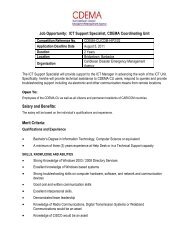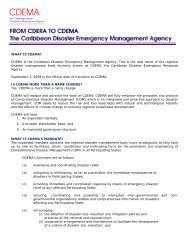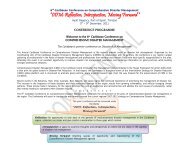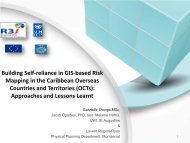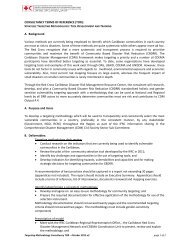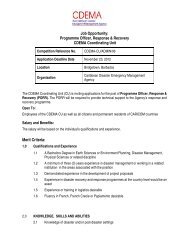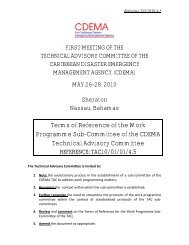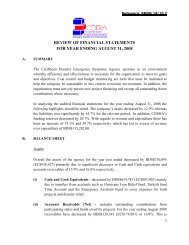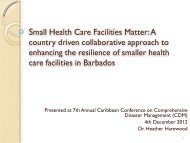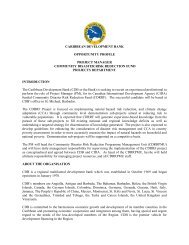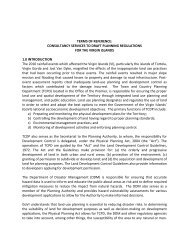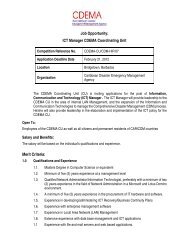You also want an ePaper? Increase the reach of your titles
YUMPU automatically turns print PDFs into web optimized ePapers that Google loves.
Although the Programme is being described as ‘model’ it should be noted, and will be emphasised in all the<br />
materials, that the approach that is taken to implementing the Programme in a community must be tailored to<br />
the governance systems and specific circumstances of that community and to the capacity of the persons<br />
taking part at any given stage. Similarly, although <strong>CDEMA</strong> has requested that the Programme “should allow<br />
for any person doing community-based climate change disaster management in the Caribbean to follow it”, it<br />
should be noted that effective implementation of the Programme will require certain skills and expertise (e.g.<br />
community animation, community mobilisation, facilitation of workshops and participatory processes), so the<br />
materials such as the Trainer’s Handbook and Training of Trainers workshop assume some prior experience<br />
of this kind. Moreover, since only a few of the elements of the Programme are being specifically designed<br />
under this sub-project, CANARI cannot guarantee the user-friendliness of all the other reference materials to<br />
which the Programme will point. For example, as noted in Appendix 2, the majority of materials contain both<br />
good practices and some disadvantages in terms of their appropriateness for delivery in a community.<br />
3.4.4. Development of the Climate Change Adaptation Module<br />
3.4.4.1 Overview and building on best practices<br />
The Climate Change Adaptation Module is intended to form part of <strong>CDEMA</strong>’s revised version of its Community<br />
Disaster Preparedness Training Manual and also to complement the IFRC’s series of handbooks on<br />
conducting community vulnerability and capacity assessments. It will also draw on other relevant best<br />
practices, as identified in Section 3.2. Since no guidelines currently exist for the structure of the revised version<br />
of <strong>CDEMA</strong>’s manual, the Module will be designed and presented in the format that CANARI deems most<br />
appropriate for community audiences and useful for the trainers who will be expected to facilitate it. The<br />
Module will be designed to be delivered as a two-day workshop, with suggestions for additional activities that<br />
could be included in a longer workshop. (These additional activities will therefore also form part of the<br />
MCCCDRR Programme.)<br />
In addition to building on the best practices identified in Section 3.2.2 above, the Module will draw on<br />
CANARI’s recent experience of developing toolkits designed to build the capacity of communities to respond to<br />
climate change (Addressing Climate Change in the Caribbean; A toolkit for Communities and Communicating<br />
Climate Change; A Toolbox for Local Organisations in the Caribbean), including the experience of facilitating<br />
workshops with community representatives in Dominican Republic, Haiti and Jamaica. These products have<br />
been well received by community-based organisations and those who support them, with particular praise for<br />
the simplicity of language in explaining complex subjects and the wide use of regional examples.<br />
The <strong>CDEMA</strong> CCA Module and accompanying Handbooks will include many of the same features, including:<br />
a) use of scientifically sound fundamental concepts, derived from scientific/research institutions, including<br />
University of the West Indies and the Caribbean Community Climate Change Centre.<br />
b) use of a wide range of interactive tools and methods, to appeal to different learning styles;<br />
c) building on participants’ existing skills and knowledge;<br />
d) simple language;<br />
e) use of clear, easily reproducible illustrations;<br />
f) use of relevant examples, both of impacts and responses, drawn as far as possible from the region;<br />
g) inclusion of the opportunities presented by climate change as well as the challenges;<br />
h) provision of templates and checklists, where appropriate; and<br />
i) lists of other relevant resources that participants can access.<br />
3.4.4.2 Target audience<br />
The Module is designed primarily for use by community facilitators and animators who are working with<br />
community groups to develop and implement disaster risk reduction plans. It can also be used as a<br />
complement to a community development planning process to ensure that the plans are climate proofed. The<br />
9



